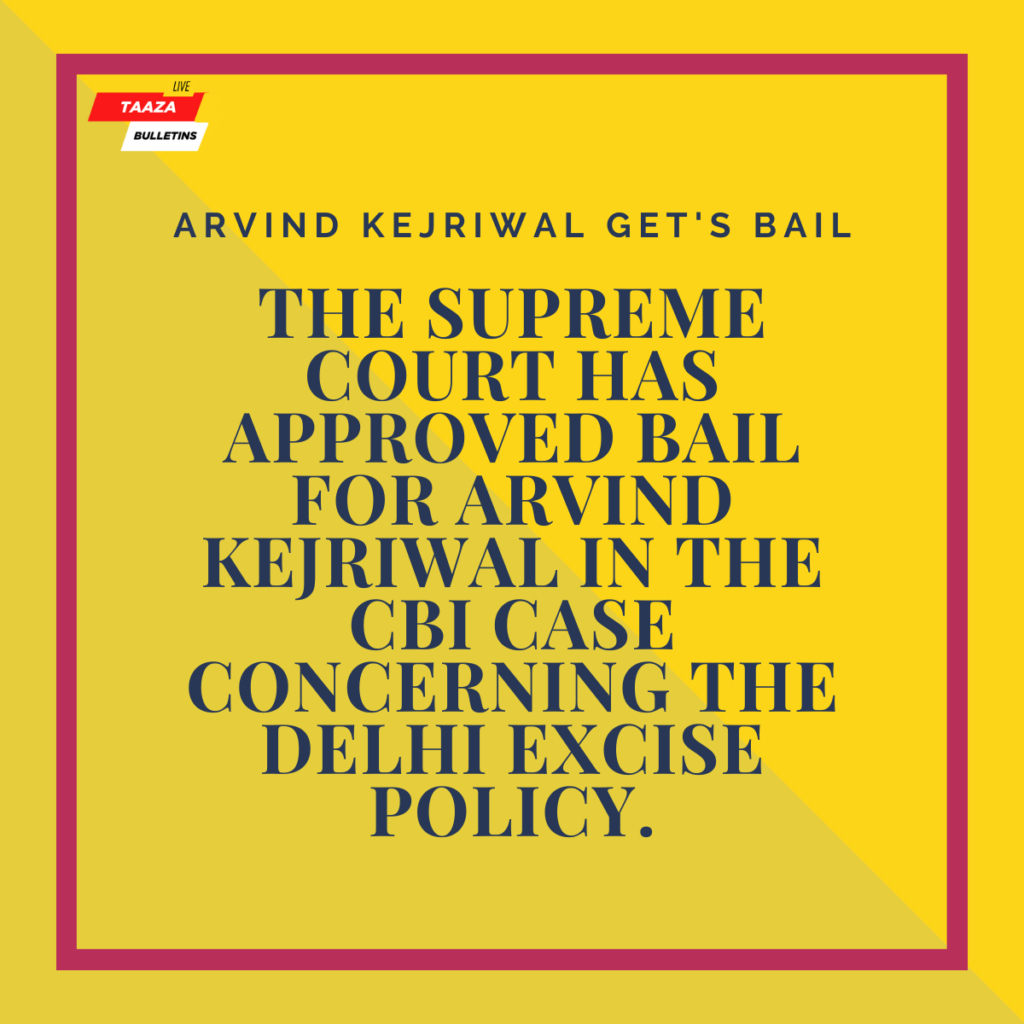Delhi Excise policy: Supreme Court grants bail to Delhi CM Arvind Kejriwal in CBI case.
A Bench comprising Justices Surya Kant and Ujjal Bhuyan issued the order after observing that the trial in the case is unlikely to reach a conclusion in the foreseeable future.

The Court determined that the leader of the Aam Aadmi Party (AAP) meets the criteria for bail and consequently ordered his release.
“We are not sending the appellant back to the trial court,” the Court stated while granting bail to Kejriwal.
Nevertheless, the Court emphasized that, given the public discourse surrounding the case, Kejriwal is prohibited from making any public statements regarding the issue.
He is required to attend all hearings before the trial court unless he is excused from personal attendance.
Notably, Justice Ujjal Bhuyan, in his separate opinion, criticized the CBI, asserting that Kejriwal’s arrest by the agency following his bail in the ED case was intended solely to obstruct his release from custody.
“The CBI did not deem it necessary to arrest him despite interrogating him in March 2023; it was only after the stay of his ED arrest that the CBI became proactive and sought custody of Kejriwal. This indicates that there was no justification for an arrest over the past 22 months. Such actions by the CBI raise significant concerns regarding the timing of the arrest, suggesting that it was merely an attempt to undermine the bail granted in the ED case,” Justice Bhuyan remarked.
He emphasized that the CBI should not operate as a mere puppet and must maintain an image free from any doubts. “The CBI must be transparent in its actions, and every attempt should be made to ensure that arrests are conducted without any display of arrogance. In a nation where public perception is crucial, the CBI must eliminate the belief that it is a controlled entity and instead demonstrate its independence. The CBI should embody the principle of being above reproach, akin to Caesar’s wife,” he stated in his directive.
Justice Kant emphasized the necessity of an advanced legal framework regarding bail for a progressive society, asserting that the extended detention of individuals awaiting trial is unjustifiable. The court also observed that the First Information Report (FIR) was filed in August 2022, with four chargesheets subsequently submitted. The trial court has acknowledged the case, and 17 defendants are scheduled for examination.
Despite a unanimous decision to grant bail, the judges expressed differing opinions on the legality of Kejriwal’s arrest by the CBI. Kejriwal submitted two distinct petitions to the Supreme Court: one contesting the legality of his CBI arrest and another requesting bail. The latter petition was approved by both judges. In relation to the former, Justice Kant determined that the arrest was lawful and adhered to the applicable procedural regulations. “There is no barrier to arresting an individual already in custody for another matter for investigative purposes.
The CBI’s application outlined the necessity of the arrest, and given the existence of a judicial order, there was no breach of Section 41(A)(3) of the Code of Criminal Procedure,” the Court remarked. When a Magistrate issues a warrant, the investigating agency is not required to provide justification, it further noted. “We have concluded that the appellant’s arrest does not exhibit any procedural deficiencies.
Therefore, the arrest is legitimate,” stated Justice Kant. Conversely, Justice Bhuyan argued that the arrest was unwarranted and cautioned against the misuse of arrest powers for targeted harassment. “It cannot be inferred that an accused’s compliance with prosecution inquiries equates to cooperation, and the right to remain silent should not be misconstrued as evasiveness; no negative inference should arise from an accused’s silence.
It would be a grave injustice to detain Kejriwal while he is on bail in the ED case. The exercise of arrest powers must be judicious, as established in the Mohd Zubair case. In the Arnab Goswami case, it was affirmed that the law should not be employed for targeted harassment,” Justice Bhuyan articulated in his separate opinion.
